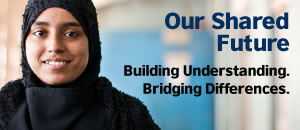 Akil Awan is RCUK Fellow in the Contemporary History of Faith, Power and TerrorThe NPCU's Dr Akil Awan was invited as the lead academic expert witness at the All Party Parliamentary Group for Global Uncertainties on the eve of eighth anniversary of the 7/7 London bombings, where he briefed parliamentarians and policymakers on violent extremism in Britain, before taking questions on the UK’s counter-terrorism strategy.
Akil Awan is RCUK Fellow in the Contemporary History of Faith, Power and TerrorThe NPCU's Dr Akil Awan was invited as the lead academic expert witness at the All Party Parliamentary Group for Global Uncertainties on the eve of eighth anniversary of the 7/7 London bombings, where he briefed parliamentarians and policymakers on violent extremism in Britain, before taking questions on the UK’s counter-terrorism strategy.
He argued that policymakers, the media, and security services had been guilty of using lazy language which had had the negative effect of presenting radicalisation as a simple conveyor-belt like process, when academics were still uncertain about the causes.
Morover, he suggested that if we were able to manipulate the outcomes of radicalisation away from violence, young people might be encouraged to experiment with radical views in order to shake them out of political apathy. Indeed, he offered, that radicalisation of young people could even potentially be a good thing, as it usually indicated a political awakening and a desire to change the world around them for the better
He contrasted the political engagement of radicals with the widespread apathy among Britain’s youth in recent years, evident from very low voter turnouts among 18 to 24-year-olds in recent elections.
He argued that this was naturally of great concern for wider society. The extent to which people are engaged with politics is critical to a democratic society, but the potentially dangerous language which has brought terms like ‘radicalisation’ into the popular lexicon, means young voters can be wary of expressing unconventional views, discouraging healthy political debate.
There’s an old adage that says: ‘If you’re young and you’re not a radical, you’ve got no soul; whereas if you’re old and still a radical, you’ve got no sense’. That sums up the important part radical politics plays in the normal political awakening of young people throughout history. It isn’t something to be feared.
Awan's book Radicalisation and Media is out in paperback here.




 Ms Tanja AITAMURTO, Finland, Visiting Researcher at the Program on Liberation Technology at Stanford University
Ms Tanja AITAMURTO, Finland, Visiting Researcher at the Program on Liberation Technology at Stanford University  Mr Paul GUYOT, France, Co-founder and CEO of Semiocast
Mr Paul GUYOT, France, Co-founder and CEO of Semiocast Mr Mikael JUNGNER, Finland, Member of Parliament
Mr Mikael JUNGNER, Finland, Member of Parliament Mr Joonas PEKKANEN, Finland, Founder of Open Ministry
Mr Joonas PEKKANEN, Finland, Founder of Open Ministry
